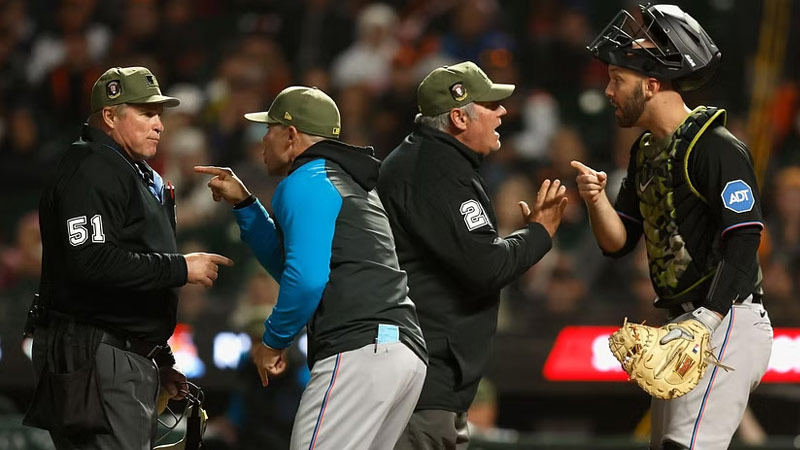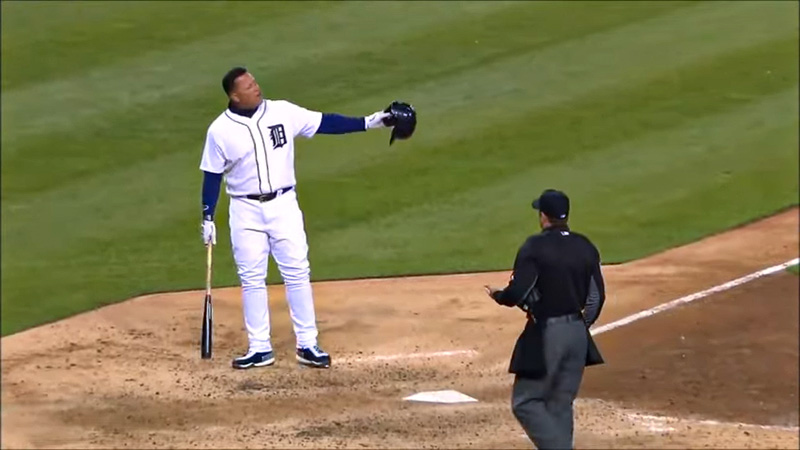Baseball is a game of strategy, skill, and split-second decisions. Amidst the fast-paced action on the field, timeouts play a vital role in ensuring player safety, allowing strategic planning, and maintaining the flow of the game.
In this blog post, we will dive into the essential aspects of baseball timeout rules, shedding light on frequently asked questions and providing a comprehensive understanding of how timeouts shape the dynamics of America’s favorite pastime.
What Are the Baseball Timeout Rules?
In baseball, there are specific rules regarding timeouts, also known as “timeouts” or “time called.” Here are the general rules regarding timeouts in baseball:
Batter’s Timeout
The batter can call for a timeout by requesting it from the umpire. The umpire may grant a timeout if they deem it necessary, usually due to an equipment issue or an injury.
Pitcher’s Timeout
The pitcher can request a timeout by stepping off the rubber or making a clear motion indicating a timeout. The umpire will grant the timeout if they deem it necessary or if the pitcher is in danger of committing a balk.
Manager/Coach Timeout
A manager or coach can call for a timeout by requesting it from the umpire. This is usually done to confer with players on the field, make substitutions, challenge a play, or discuss strategy.
Umpire-Initiated Timeout
The umpire can call for a timeout at their discretion, such as to clean the baseball, resolve a dispute, or attend to an injured player.
Time Limit for Timeout
There is no specific time limit for a timeout, but it is generally expected that the pause in the game will be brief and for a valid reason. Umpires have the authority to deny excessive or unnecessary timeout requests.
It’s important to note that during a timeout, play is halted, and all players must stop their actions and remain in their positions until play resumes. Once the timeout is over, the umpire will indicate that the game is back in play, and the action continues.
It’s worth mentioning that the specific rules and regulations regarding timeouts may vary slightly depending on the league, level of play, or competition, but the principles outlined above are generally followed in baseball.
Who Calls a Timeout in Baseball?
Timeouts in baseball can be called by various individuals involved in the game. Players, such as batters and pitchers, can request timeouts by signaling to the umpire or stepping off the rubber.
Managers or coaches can also call for timeouts to make strategic decisions, challenging plays, or confer with players. Additionally, umpires have the authority to initiate timeouts when necessary, such as to attend to an injured player or resolve a dispute.
The responsibility of calling a timeout ultimately lies with the individuals on the field who require a pause in the game or those with the authority to manage the flow of the game.
Baseball Timeout Rules in MLB
In Major League Baseball (MLB), there are specific rules governing timeouts, ensuring fair play, and maintaining the flow of the game.
In MLB, batters have the ability to call for a timeout by making a request to the umpire. The umpire has the discretion to grant or deny the timeout based on the situation. Pitchers can also request a timeout by stepping off the rubber or making a clear motion indicating a timeout.
Similarly, managers and coaches can call for a timeout to confer with players, make substitutions, challenge plays, or discuss strategy. Umpires can initiate a timeout as well, addressing issues such as cleaning the baseball or attending to an injured player.
Timeouts in MLB do not have a specific time limit, but they are expected to be brief and for valid reasons. Umpires have the authority to deny excessive or unnecessary timeout requests.
During a timeout, play is halted, and all players must stop their actions and remain in their positions until play resumes. Once the timeout is over, the umpire will indicate that the game is back in play, and the action continues.
These timeout rules in MLB aim to balance the need for brief interruptions with the smooth progression of the game.
Situations When the Timeout Rules are Applied

Source: sportskeeda.com
The timeout rules in baseball are typically applied in the following situations:
- Injury Timeout: If a player on the field is injured or needs medical attention, a timeout may be called to allow for the player’s evaluation and treatment.
- Equipment Issue: If a player’s equipment, such as a helmet or glove, becomes damaged or needs adjustment, they may request a timeout to address the issue.
- Conference on the Mound: The manager or coach may call for a timeout to have a meeting with the pitcher and infielders on the pitcher’s mound to discuss strategy, make pitching changes, or provide instructions.
- Substitutions: When a team wants to make player substitutions, they may call for a timeout to allow the new players to enter the game and the outgoing players to leave the field.
- Challenge or Review: If a manager wants to challenge a play or have a call reviewed by instant replay, they may call for a timeout to initiate the challenge or review process.
- Umpire’s Discretion: Umpires have the authority to call a timeout in situations where they need to attend to an injured player, clean the baseball, address a dispute, or ensure fair play.
It’s important to note that the specific situations where timeouts are applied may vary depending on the league, level of play, or competition, but these are some common scenarios where timeouts are typically called in baseball.
Penalties For Baseball Timeout Rules
In baseball, there are generally no penalties specifically designated for violating timeout rules. However, there are consequences that may occur as a result of certain timeout-related actions. Here are some scenarios and their corresponding consequences:
Excessive Timeout Requests
If a player or team abuses the privilege of calling timeouts excessively or unnecessarily, the umpire may deny subsequent timeout requests or issue a warning to the team. Continued abuse may result in ejection or disciplinary action.
Delay of Game
If a player or team deliberately delays the resumption of play after a timeout, it may be considered a delay of the game. This can lead to warnings, ejections, or penalties, such as advancing baserunners or awarding balls or strikes to the opposing team.
Invalid Timeout Requests
If a player requests a timeout when it is not allowed, such as during a live ball situation, the umpire will deny the request, and play will continue. There are no specific penalties associated with this, but the player may face a disadvantageous situation on the field.
It’s important to note that the consequences for timeout-related infractions are at the discretion of the umpires and can vary based on the severity and frequency of the violation. The primary objective is to maintain the integrity and pace of the game while ensuring fair play.
Significance of Baseball Timeout Rules
The baseball timeout rules serve several important purposes in the game:
Injury Management
Timeout rules allow for the immediate assessment and treatment of injured players. This ensures their well-being and prevents further harm by providing them with necessary medical attention.
Strategic Planning
Timeouts provide an opportunity for managers, coaches, and players to discuss tactics, make substitutions, or challenge plays. These moments allow teams to strategize and adjust their approach to maximize their chances of success.
Equipment Adjustments
Timeout rules enable players to address equipment issues promptly. This ensures that players can perform at their best and maintain the integrity of the game without any hindrances caused by faulty or inadequate equipment.
Game Flow and Fairness
Timeout rules help regulate the pace of the game and prevent unnecessary delays. Umpires have the authority to manage timeout requests and ensure that they are reasonable, preventing abuses that may disrupt the flow of the game or provide unfair advantages to a team.
Fan Engagement
Timeouts provide breaks in the action, allowing fans to catch their breath, engage in discussions, or participate in stadium activities. These moments contribute to the overall entertainment value of the game.
The timeout rules in baseball help balance the need for player safety, strategic planning, game flow, and fan engagement.
They play a crucial role in maintaining fairness, managing the game effectively, and enhancing the overall experience for everyone involved.
FAQs
When can a timeout be called in baseball?
Timeouts in baseball can be called in various situations. Players may request timeouts for injuries or equipment issues, pitchers can call timeouts to gather themselves or prevent a balk, managers can call timeouts for strategic discussions or challenges, and umpires may initiate timeouts to address disputes or injuries.
How long does a timeout last in baseball?
Unlike other sports with fixed durations for timeouts, baseball timeouts do not have specific time limits. The duration of a timeout is typically brief and depends on the nature of the situation. Umpires have the authority to deny excessive or unnecessary timeout requests to maintain the pace of the game.
Can a timeout be called during live ball situations?
No, timeouts cannot be called during live ball situations. Players must wait for a dead ball scenario, such as when the pitcher is off the rubber or when the ball is out of play, to request a timeout. Umpires will deny timeout requests if they are made during live ball situations.
What are the consequences of excessive timeout requests?
While there are no specific penalties for violating timeout rules, umpires can deny subsequent timeout requests or issue warnings to teams that abuse the privilege. Continued abuse may result in ejections or other disciplinary actions that can affect the team’s performance.
Can timeouts be used strategically to disrupt the opposing team’s momentum?
Timeouts can be used strategically to disrupt the opposing team’s momentum, especially when the opposing pitcher or fielders are in a rhythm. By calling a timeout, a batter or manager can momentarily break the flow of the game, providing an opportunity to regroup, plan, and potentially affect the opposing team’s focus.
End Call
Baseball timeout rules are an essential aspect of the game, ensuring player safety, facilitating strategic planning and maintaining fairness.
Whether it’s for injury management, equipment adjustments, or tactical discussions, timeouts play a crucial role in the dynamics of baseball.
Understanding these rules allows players, coaches, and fans to appreciate the strategic nuances and the importance of well-timed pauses within the game.
So the next time you’re watching or playing baseball, keep these timeout rules in mind, and you’ll have a deeper appreciation for the intricacies of the sport.







